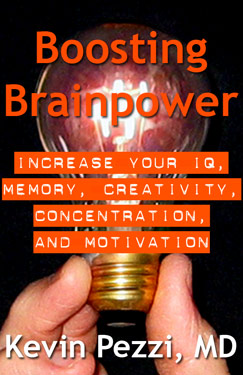1. Increasing intelligence
2. Concerned about NOT getting into medical school?
3. Are prestigious medical schools better?
Q: I have a concern that is discouraging me from trying to become a doctor. What if I go through four years of college and do not obtain high enough grades or MCAT scores to get into medical school? Or what if I could get in, but not to a prestigious medical school?
Want more fun and less work?
Want smiles, not stress?
Read Dr. Pezzi's free e-book
Microhome Living

Answer by Kevin Pezzi, MD: I'll address your latter question first. I've never heard of any evidence suggesting that more prestigious medical schools impart more knowledge than other med schools. When I took my board exams, I knew that Wayne State University School of Medicine had done a superb job of educating me, because not only did I know the answer to almost every question, but I knew it so well that it seemed as if I'd studied that material seconds beforehand. Wayne State is generally regarded as an average school, yet I knew that students at Harvard or Yale didn't know any more than I did. Judging from my scores, they must have learned less.
What you get out of medical school depends more on you than on the institution. Your achievement depends on your intelligence, long-term memory, personality, dedication, conscientiousness, and health. I addressed all of those topics (and much more) in either this site or the many question and answer pages in www.ERbook.net. If you take the time to read everything I've written*, you'll emerge not only knowing more, but actually with a slightly higher IQ if you replicate one of my tips for augmenting brainpower: don't just look at the information presented by the author or professor, but analyze how he logically concatenates that info using deduction, inference, analogy, corroboration, and even relevant tangents that help set the scene in your brain for that all-important connect-the-dots moment ("eureka," "aha!," "now I get it," etc.).
* The material in my ER sites is just a small fraction of what I've written in my other sites and books. I have several pending books that I'll release in the near future, so you may wish to check back soon.
Many people confuse knowledge with intelligence. Your knowledge is the sum of facts stored in your brain. Intelligence is essentially a set of rules for processing information. Computer memory chips (e.g., RAM, ROM) store information, but do not process it. The latter takes place in the CPU, which is where the intelligence of a computer lies. Similarly, some parts of the brain are specialized for storing information, while other parts are geared toward processing it. Techniques for improving memory do little to affect intelligence, and vice-versa. Parenthetically, this offers partial insight into how some people can be very intelligent yet not particularly knowledgeable, while others have heads packed with lots of facts but without the ability to do much with them. Since intelligence is essentially a set of rules for processing information, you can boost your IQ by amending those rules. This is analogous to rewriting a computer program to increase its efficiency or improve its informational analysis. It is common knowledge that memory can be improved with practice, but educators are only now slowly acknowledging that intelligence can also be improved—something that I've written about for many years. Incidentally, my techniques for enhancing intelligence and creativity are much more diverse than the ones utilized in the research I've read about, which is why my techniques are more effective.
I'll segue into your other question by mentioning that you will have a much better chance of success if you follow all of my tips. One of the people I once mentored reminds me very much of you: she dearly wanted to become a doctor, yet highly doubted that she had The Right Stuff. I gave her advice on how to achieve her goal, and she is now a physician, professor of medicine, and head of her department at a major university medical school. She and others are living proof that my methods work.
However, I do not mean to brush off your concern about investing four years of your life (and lots of money, of course) into pursuing a dream that may not pan out. This has traditionally been one of the major risks faced by pre-medical students. Most don't make it into med school, so what on Earth can you do with a bachelor's degree in zoology, for example? Not much—at least not in medicine. The best solution to this problem is to choose a major that is itself readily marketable, such as chemical engineering. As an example of something on the other end of the spectrum, people with bachelor's degrees in psychology can't do much more than advise their friends, so I'd think twice about that major unless you intend to pursue an advanced degree in it.
Every person thinking of going into medicine needs to know the following:
- Medicine is now a much more desirable career (read that topic to see why) and it will remain that way for the rest of your life, even if you are now only ten years old—yes, I have some kids that young writing to me, and I heartily applaud their initiative!
- Once people figure out the huge benefit that medicine now offers, more people than ever will flock into that field. With more competition for every available medical school slot, getting into medical school will be increasingly more difficult. That's good news for future patients, because they will have doctors that are smarter, more knowledgeable, and more dedicated. However, that is bad news for people who don't want to work very hard. Whenever an occupation becomes more desirable, it inevitably lures more people into it, so the bar for entrance (grades and MCAT scores in the case of medicine) can be set that much higher.
I spent a few weeks researching what caused the financial Collapse of 2008 because I need that information to make wise long-term decisions regarding my inventions. I began that research with the same concern that millions of others had about our economy, but emerged from it absolutely horrified at our long-term prospects for a full recovery. It was like surgically opening a patient with a ruptured appendix only to find that he was full of cancer. As I mentioned in my extensive analysis of what led to the meltdown and how we (as a society) should address it, we will never fully recover from this mess. The appendix may be fixed (the stock market will rebound), but the cancer remains (the many defects in our economy cannot be eradicated**). Consequently, the long-term prospects are poor for many once-lucrative jobs, but healthcare occupations will continue to be in demand. In fact, the current shortage of doctors and nurses will only get worse as the American population becomes increasingly aged.
** Why? This disaster stemmed not just from economic woes but also from irrational thought that initiated the problems and perpetuated them. Unfortunately, the same mental errors that triggered the meltdown are still at work botching our political and economic world. Changing people's behavior and ingrained manner of thinking is next to impossible because most people think they're fine just the way they are and hence don't appreciate the need to change.
Back to the topic of prestigious medical schools: If you read my review of White Coat: Becoming a Doctor at Harvard Medical School, you will see one reason why prestigious medical schools do not necessarily graduate better doctors even if they attract smarter students (and even that is debatable, given some of their wacky admission criteria). The author of that book, Dr. Ellen Lerner Rothman, seems to be very intelligent and is probably very knowledgeable about medicine, too. However, it takes more than IQ and medical knowledge to be a very good doctor; you need a huge fund of basic knowledge, too. I discussed this in my www.ERbook.net site on this page (search for the question that begins with Another route I thought about). I also discuss the importance of a broad base of knowledge for doctors in this site.
Back to the main Question & Answer page
Notes:
- What Makes a Good Mentor and Mentee?
- Benefit Of A Mentor: Disadvantaged Teens Twice As Likely To Attend College
- Youth-Mentor Relationships Particularly Helpful for Those Experiencing Hardship
- Gaining New Insights Into Mentoring Programs For Adolescent Girls
- Mentor-Protégé Relationships: Age Gap Really Does Matter
Comment: OK, I'll stop aging! :-) - 3 Inexpensive Ways to Study for the MCAT
- MCAT predicts differently for students who test with extra time
Excerpt: “… applicants to U.S. medical schools … with disabilities who obtained extra test administration time for the Medical College Admission Test … had lower rates of passing the United States Medical Licensing Examination Step examinations and of medical school graduation …”
Comment: Very predictable.

